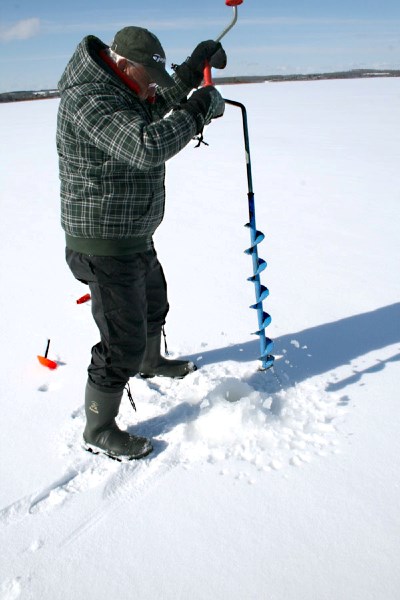The long winter with cold temperatures and heavy snowfall could be responsible for killing fish in St. Vincent Lake. While dead fish have been reported by local anglers to Fish and Wildlife, the extent of the possible kill will remain unknown until the ice thaws.
Sustainable Resources Development (SRD) confirmed receiving a call on March 23 from an angler who spotted a few dead yellow perch under the ice. Fish and Wildlife plan to investigate the extent of the winter kills once the ice is off.
St. Paul resident Chuck Ouellette drilled a hole with an auger in mid-March, and what turned up smelled like a sewer, he said. He went back on Saturday and drilled near the same spot, but did not notice the same bad smell. Local anglers want to know what could be causing fish to die, he said.
Vincent Lake has a history of partial fish kills, said SRD spokeswoman Trisha Anderson. Shallow lakes can create low oxygen situations which can kill fish, she said. Oxygen can deplete over winter, she said.
“If you have a more shallow lake with thick ice and there's been a ton of snow fall, you're not getting a lot of light going through the lake," she explained. “Without light, you don't get a lot of plants producing oxygen like they normally would."
Plants also consume oxygen during decomposition. Combined with a long winter, thick ice and lots of snow, oxygen levels can deplete, she said.
“We may see more this spring because we've had this long cold winter and we've had heavy snowfall," Anderson warned.
Ouellette estimated the ice on Saturday to be nearly three feet thick.
Vincent Lake has decreasing water levels and is considered an eutrophic lake, which is a lake that receives lots of nutrients, she explained. A lake with a lot of nutrients can have a lot of vegetation, which starts that cycle of growth and decomposition, she said. The agricultural activity around the lake is one of the causes of the nutrients, she added.
The lake is home to northern pike and yellow perch. Vincent Lake was stocked in the 1980s and 1990s with walleye and was closed to walleye and pike harvest from 1996 to 2000.
Harvest of the species reopened in 2003, but an extensive fish kill in 2004 occurred.
After the 2004 fish kill, anglers couldn't catch anything and it took years for the fish to come back, said Ouellette, who has owned a cottage on Vincent Lake for over 20 years.
Public meetings after 2004 resulted in the decision not to restock because walleye seem unable to survive, said Anderson. Pike tend to be more resilient to the winter kill than walleye, she said. The public meetings also identified the limited walleye harvest.
“This limited harvest, coupled with the knowledge that winterkills can occur, likely signalled to the public that a northern pike and yellow perch fishery was more practical and would result in better recreational fishing opportunities," said Anderson in an email.
Ouellette noted that walleye are “vicious" fish that eat minnows and other species.
Test netting since the 2004 kill confirmed the presence of pike and perch. Walleye have also been reported but have not been confirmed, according to SRD.
Ouellette wants to find out if anything can be done to prevent a kill from happening again, like monitoring oxygen levels or removing snow from a portion of the ice.
SRD encourages the public to contact Fish and Wildlife if they spot dead fish in lakes.



